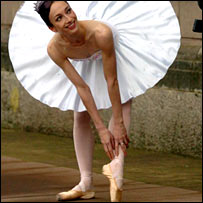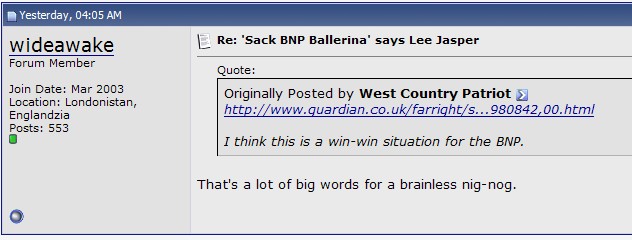There was always going to be two ways which Nick Griffin and the BNP would react once Question Time had shown: if he put in a relatively good performance, they were going to crow about how the mainstream had been taken on and vanquished. If he wasn't so good, they were going to claim that it was the usual establishment stitch-up, and that when forced into such a bear-pit, Griffin was always going to struggle.
As it happened, Griffin and the party have actually done both. Within an hour of the programme ending the party had sent out an email filled with "quotes" from viewers of how well he did and how despite being roughed up by the other panellists he had came out on top. Even in that though there was the starts of the moaning of how it was all a set-up: no "current affairs" questions; how the show was filmed in central London in the "most 'enriched' and 'diverse' part of Britain". Since then, clearly worried by just how poorly he was perceived to have done, Griffin's gone into meltdown, claiming bias, that he couldn't get a fair crack of the whip because London has been "ethnically cleansed", that the audience was a "lynch mob", and that if the show was filmed in Thurrock, Stoke or Burnley then the true picture of the support for him and his party's policies would become evident.
This was always going to be the problem with inviting Griffin onto Question Time and not instead dedicating a programme to him and his party alone with set questions. The whole Question Time format is based on the audience asking the questions, and the audience was always going to be concerned first and foremost with him and his policies rather than what's actually been happening this week beyond the QT studio. Even in such a benevolent atmosphere though the panellists, with the exception of Bonnie Greer, were mainly incredibly poor, Sayeedi Warsi and Jack Straw especially so. There was next to no actual discussion or consideration of the BNP's policies outside of immigration and racism, and not even for example the bringing up of the party's policy on voluntary repatriation, which is such an open goal it was absurd not to mention it. Griffin still however managed to hang himself with his own rope, his gaffe on David Duke being from the "non-violent Ku Klux Klan" being both amusing and revealing. His only real success was that he didn't say anything objectively outrageous, instead doing his usual act on why Islam isn't compatible with the British society which he actively loathes. At times he was just cowardly, claiming that he couldn't explain his past reasoning on why he denied the Holocaust because he could be arrested if he did so. As much as New Labour has made this a less free society, there is not yet any law which explicitly criminalises Holocaust denial, although seeing as Holocaust denial and inciting racial hatred usually go hand in hand you could perhaps see some sort of reasoning behind his caution.
The biggest failing of the evening by far was in fact the cowardice of the other panel members to challenge the overwhelming consensus on immigration, that it has been both uncontrolled and to the detriment of the country. This cowardice is centred on the view that on this point, the BNP actually has the upper hand, and indeed, the moral authority. Jack Straw, questioned on whether Labour's policies had helped the BNP, which they undoubtedly have, not so much on immigration but on the complete abandonment of their former base in favour of the mythical "centre" ground and aspirational middle class, simply prevaricated and waffled. Sayeedi Warsi advocated the equally unrealistic Tory policy of a cap and Chris Huhne brought up the old red herring of Labour's prediction of how many would come when the eastern European countries joined the EU, without mentioning that was an estimate based on the other EU states also opening their borders, when only ourselves, Ireland and Sweden did, without offering an real alternative to Labour's policy except the empty promise of "counting people out". How can you even begin to challenge the BNP when you won't even make the case for a policy which has been to the vast benefit of the country as a whole?
Apart from Griffin, it was Jack Straw who looked out of his depth. His claim that the BNP was different from the other political parties because they all had a "moral compass" while the BNP didn't was fatuousness at its finest, leading Griffin to score his only real point of the evening. How could Jack Straw claim to have a moral compass when he indirectly had the blood of 800,000 Iraqis on his hands? There was no answer to that, and the audience was also sheepishly quiet as he made it. Even stopped clocks are right twice a day, but it also underlined how Labour has still yet to have its real day of reckoning for some of the things that it has done.
At worst, the spectacle was the bear-baiting some have described it as. At its best, it was a show that will have done nothing to alter the views of absolutely anyone. Those already sympathetic towards the BNP will hardly have been put off, and may well have felt sympathy for the way Griffin was barracked. Those on the opposite side should perhaps be worried about just that, and how despite coming off badly, Griffin was hardly given anything resembling a knock-out blow. This is certainly not Weimar Germany, and Griffin is certainly not a Fuhrer in waiting, and while we shouldn't keep ourselves awake at night about the BNP's support, it still remains an indictment of our politics that Griffin should have achieved the votes necessary to make his appearance on our televisions a requirement of the BBC's "impartiality".Labels: British National Party, fascists, Nick Griffin, politics, racism, tackling extremism










